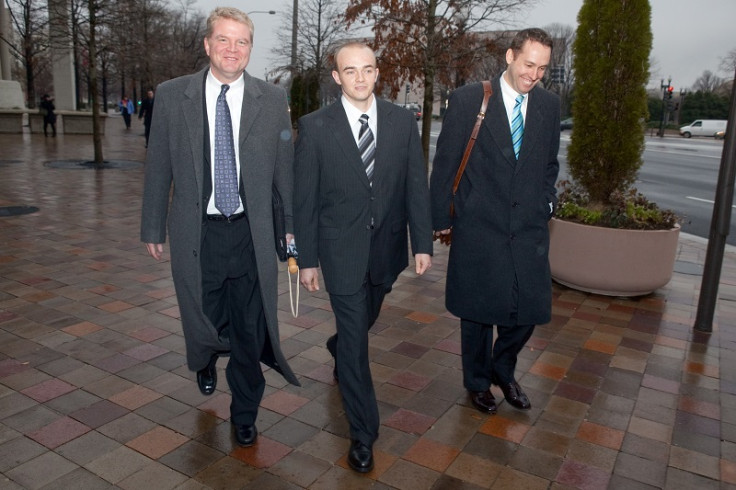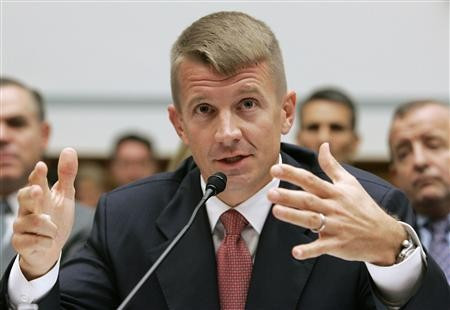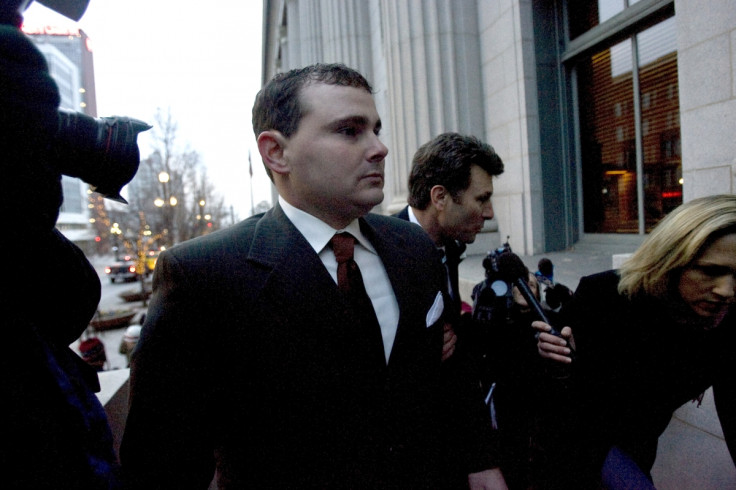Blackwater 'soldiers of fortune' jailing over Iraq massacre sheds light on risks of private military contracts

On 16 September 2007, a convoy of four trucks approached Nisour Square in downtown Baghdad. The traffic had been stopped in both directions, as was typical for military convoys, but when the soldiers noticed that a car was still moving towards them they opened fire.
Ahmed Haithem Ahmed and his mother, Mohassin, were driving a white Kia sedan and were, their family later told prosecutors, running a family errand when they happened across the Blackwater convoy. Both were shot dead and, in the ensuing chaos, the Blackwater employees – who claimed they were under fire from militants – turned their guns on the crowd.
Within minutes, 14 people were dead and 17 injured in what has become known as the Nisour Square Massacre, one of the darkest periods of the American occupation of Iraq. Witness reports described how a mother was killed trying to protect her daughter and another man pumped with bullets as he lay dead on the ground. Others were shot as they tried to run away.
"That day changed my life together," Ali, whose nine-year-old son was killed, said in court documents released during the trial. "[It] destroyed me completely."
On Monday (13 April), three of the men involved – Paul Slough, Evan Liberty and Dustin Heard – were found guilty of 13 charges of voluntary manslaughter and 17 charges of attempted manslaughter and sentenced to 30 years in a US prison. A fourth man, Nicholas Slatten, a former military sniper, was convicted of first degree murder and jailed for life.
A statement from the US Attorney's Office described the massacre as "staggering" and claimed that nobody in the crowd posed any risk whatsoever to the Raven 23 convoy in which the men were travelling. "In killing and maiming unarmed civilians, these defendants acted unreasonably and without justification," it said.
Blackwater, the defence giant that has undergone more than one name change since the incident and is now called Academi, said Tuesday that it was relieved that the court had completed its investigation and was quick to point out that "the security industry has evolved drastically since those events", improving training in ethics and compliance for its staff.
Once one of the world's biggest defence contractors, the New York Times reported that Blackwater had won in total more than $1bn (£679m) in government contracts, most of them during the Iraq war. The founder of Blackwater, Erik Prince, admitted in 2013 that Blackwater had effectively been the "virtual extension of the CIA" in the early 2000s and was tasked with missions that the US spy agency would not do in-house.
In 2010, Blackwater – by then re-branded as Xe – won a $100m contract to protect US embassies in Afghanistan, despite the growing furore by then about the Nisour Square killing, which intensified after the case against the four men was thrown out of a US court in 2009. The firm has since been sold but still competes for US military contracts under its new name.

The fact that the shooters were private military contractors rather than army personnel served to highlight the huge involvement of the latter in the Iraq war and subsequent occupation of the country. Between 2002 and 2011 the US government spent $200bn on civilian and military contracts in Iraq and Afghanistan, a fact later criticised as an "over-reliance" by US lawmakers.
Acting with gloves off
Matt Kennard, a fellow at the Centre for Investigative Journalism and the author of Irregular Army: How the US Military Recruited Neo-Nazis, Gang Members, and Criminals to Fight the War on Terrorsaid that during his research for his book he spoke to a number of violently-minded former US servicemen that were envious of the lack of scrutiny military contractors received.
"There was a real jealousy of the private security contractors operating alongside them because the perception was that they were acting with gloves off. The legal regime that governed private security contractors' conduct was inchoate and ill-defined, so there was a sense they could do what they wanted. They were also paid much more money," he told IBTimes UK.
It is very hard to figure out who has jurisdiction and what state is responsible for enforcing domestic law against them. International law is widely found to be lacking
In his book, Kennard looked how the US military had thrown many of its own regulations for recruitment and retention in service out the window during the Iraq conflict, but he pointed out that firms such as Blackwater didn't have those regulations to begin with.
"They could employ shock troops from anywhere in the world – so they mined apartheid era security officials from South Africa, Pinochet-era operatives from Chile, and so on. There were no checks. They would argue that this was because they weren't meant to be involved in active military operations, but merely provide security to top officials and secure sites around the country. Nisour Square shows that this distinction does not really exist in a war zone," he said.
Indeed, a problem raised by the defence during the trial was whether the four ex-mercenaries could even be legally tried for their offences – something that was dismissed by the judge but will likely form part of any appeal. This is a common problem with taking action against private contractors working overseas, experts say.
"You will have contractors who are, say, nationals of Peru or Uganda, working on a contract funded by the US, for example, in a third country such as Iraq. It is very hard to figure out who has jurisdiction and what state is responsible for enforcing domestic law against them. International law is widely found to be lacking," said Molly Dunigan, a political scientist at the RAND Corporation and author of various books and studies on private military contractors.
![U.S. Withdraws from Iraq: Final Moments [SLIDESHOW]](https://d.ibtimes.co.uk/en/full/206596/us-withdraws-iraq-final-moments-slideshow.jpg?w=736&f=8ea85f828cd7c10095d0ce76a43db9a4)
A growth industry
It could be assumed that the end of the wars in Iraq and Afghanistan would lead to a sharp decline in military contractors, but defence cuts coupled with the need to protest international staff overseas has actually made the private contracting industry relatively healthy, Dunigan said. Most of the cuts to staff have come in non-military roles such as construction, cooking and transport, but the need for security and logistics in conflict zones is growing.
She points out that the former head of Blackwater, Prince, now runs an extremely successful logistics-focused military contracting company in Hong Kong. Meanwhile, the mercenary industry continues to thrive in other areas, such as the fight against Boko Haram. In March it was reported that alongside a regional fighting force that includes Chad, Cameroon and Niger, Nigeria had drafted in South African mercenaries to help fight Boko Haram in the north of the country.
I don't think the heyday of private security contractors is over. I think it's just beginning
It would not be the first time that mercenary firms had been employed to help deal with an African rebel group. The South African military firm Executive Outcomes was deployed in both Uganda and Sierra Leone in 1995 to help fight the Revolutionary United Front (RUF), which had sacked towns and cities and killed hundreds of villagers.
"I don't think the heyday of private security contractors is over. I think it's just beginning. The focus has been on the US military and the war on terror, but multinational corporations are increasingly turning to private security firms to guard their assets, and deal with unwanted dissidents, from the Niger Delta to Honduras. This is a growth industry," said Kennard.
The security industry that was once seen as an essential part of any troop deployment in the Middle East and elsewhere has come under fire, however. A US bipartisan committee on military contractors and the defence industry published a damning report in 2011 which criticised the US government for the wide use of military contractors in Iraq.
"By 'over-reliant' we mean they've become the default option. Contractors have performed some tasks reserved for federal personnel; tasks that the law or policy or regulations require be reserved for federal personnel. And even those that are legally permitted, contracting out some tasks may be inappropriate and unacceptably risky to US interests," the committee said in comments published alongside the report.
It also pointed to widespread fraud and waste which accounted for between $31bn and $60bn out of the overall $200bn figure. It estimated waste amounted to between 10-20% of total contract spending by the US government and fraud between 5-9%. It attributed both fraud and abuses of power to a lack of oversight of military contractors.

But the lack of legal framework and oversight that the US soldiers Kennard spoke to so envied of their private sector colleagues actually ended up being far more harmful to the Nisour Square four than it would have been had they been enlisted soldiers.
As per previous cases of US soldiers receiving court martials for their actions in Iraq or Afghanistan, a military court would never have imposed 30 years to life on a US serviceman.
"This was such a diplomatic travesty for the US government and Iraq that an example is being made of them," said Dunigan.
"It is not unfeasible that there were some deployment-related stress issues here that could have been exasperated in the fog of war, and if that is the case, then a 30-year to life sentence is not a solution. It is putting a Band-Aid on the problem. It isn't recognising that these things could happen again and putting more careful vetting or training, or more resources."
© Copyright IBTimes 2025. All rights reserved.






















